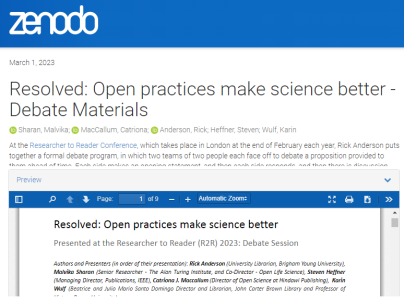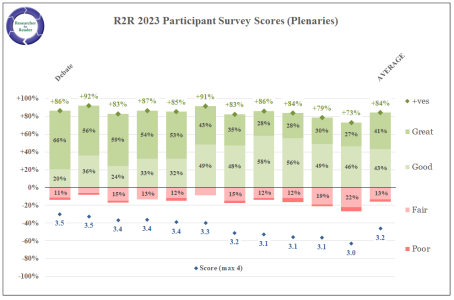Tasha Mellins-Cohen | Q: If not open what? |
Bernie Folan | Nice Tasha |
Mark Carden | What does the history of science tell us? How open were Newton or Tesla or Edison? |
Mark Carden | Does closed give us speed but [open] give us quality? |
Alison Mudditt | Who gets to define 'quality' |
Ellie Key | Mark speed and quality are not mutually exclusive nor intrinsically connected to openness |
Mithu Lucraft | Funders were referenced as driving the change towards open but the slow shift suggests there's cultural change needed to showcase the gains from openness what is needed to help that culture shift? |
Phil Jones | What about publicly funded research? Should this not be communicated openly? |
Zoe Wake Hyde | There would be more money there if it wasn't extracted out as huge profits... |
Jo Appleford-Cook | Q: are the panelists advocating actively pulling back on current sharing practices? Or just a halt to pushing further ahead? |
Mithu Lucraft | Ellie is it just mistrust? I think it's more broadly about community norms - it's effort to share your data or code it's often done as an after thought when the researcher's already moving on - it needs to be embedded practice but it's not the norm to think like that yet - so that's what I mean by culture shift |
Ellie Key | Mithu I think that's a lack of appreciation of the value of sharing data and code. Need to educate about why it's important and bring it much further forward in their research thinking and planning |
Arend | "I used to believe the "" there is enough money in the system"" argument before I worked in the Middle East and China |
Ed Gerstner | Retractions [aren't] restricted by papers having been paid for |
Arend | ...and they are part of scholarly communication! |
Robyn Mugridge | If we take too much time to pause and discuss best OA practices we risk grounding progress to a halt... |
Bernie Folan | Comment not question. This discussion highlighting what works and what doesn't (e.g. anonymous peer review) is useful for finding fixes. I would like to hear all the other areas that need improvement on the way to equitable participatory open scholarship/science. |
Mark Carden | We have had 15 years of OA chaos! Maybe a 5-year pause for thought starting 15 years ago would have been better! |
Tasha Mellins-Cohen | I don't think it's chaos so much as constructive disruption |
Zoe Wake Hyde | Agreed Tasha! |
Mithu Lucraft | Bernie I think it's a separate panel looking at what is holding researchers back maybe? |
Mithu Lucraft | Bernie there's been some excellent market research in this area looking at what researchers do/don't want to be transparent or share and why |
Mathew Willmott | "I've heard a couple times reference to the current system being an ideal alignment of incentives or that it ""functions"" - from the librarian perspective I'm not sure I agree with that (neither on business model incentives aligning - which is where the serials crisis came from - nor from the ability to include underfunded researchers in the scholarly communications process)" |
Mathew Willmott | (assuming that the current system as referred by the panelists = the subscription system) |




